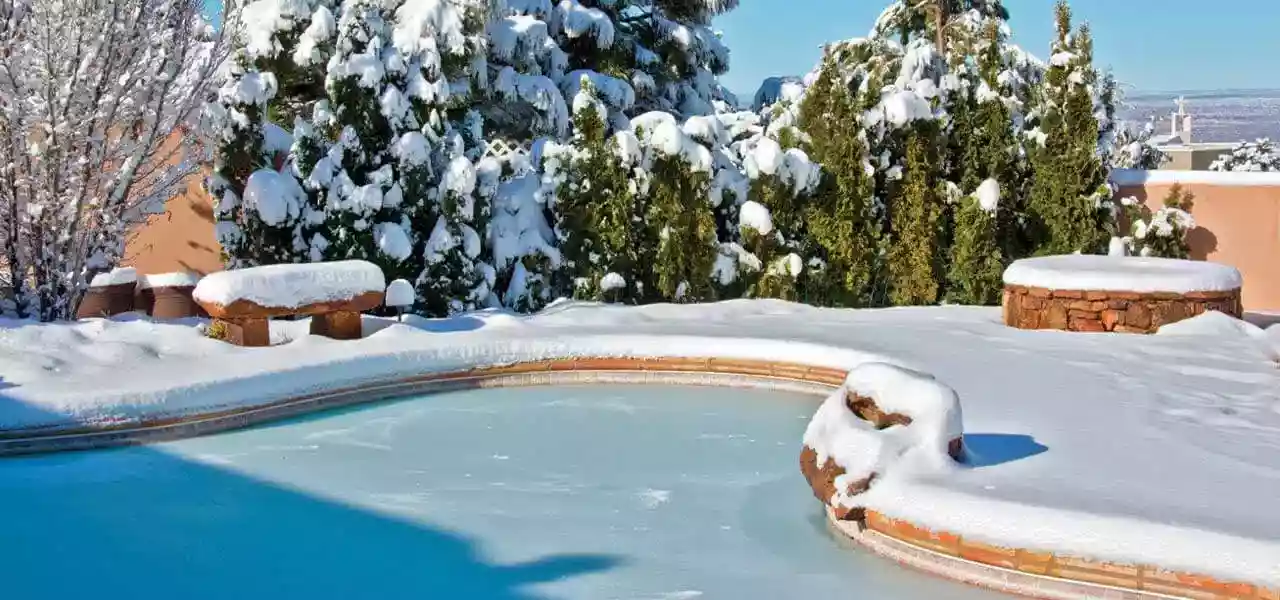10% Off Sitewide Sale + Free Shipping No Minimum*

What to Do With a Frozen Pool
Winter is a lot like summer — you either love the extreme weather, or you loathe it. But regardless of your feelings towards the frigid temps, the colder months can cause a pile of pool problems if you're not prepared. From a frozen pool, to broken water pipes, prepping your pool and equipment is key to avoiding major issues.
So if winter is coming your way, follow the steps in this guide to keep your pool from freezing. And if your pool does end up looking like a frozen ice skating rink, we'll guide you through the steps to remedy the problem.

Can Pools Freeze Solid?
They sure can! A pool with little to no water circulation can freeze solid within days of being exposed to below zero temperatures. Stagnant water in your pool will slowly develop a sheet of ice across the surface that can thicken by almost 1/4" every day. In extremely cold climates, like in the northern U.S., pools can form an ice sheet nearly a foot thick during prolonged cold spells.
As the water underneath the ice sheet gets cold and starts to freeze, it will expand and put pressure on its surroundings. For an inground pool, this means the pool lining or tiles, and the skimmer. But because inground pools are solid structures, it would take a great deal of pressure to cause damage to the lining or tiles. An above ground pool is at much higher risk for ice damage. If pressure from the ice becomes strong enough, the walls of your above ground pool can stretch and even break.
Regularly running the pool pump and monitoring the water's surface is key to avoiding a frozen pool. A little ice on the surface of the water is the first sign of trouble ahead.
When to Winterize Your Pool

Winterizing your pool is typically the best way to avoid freeze damage if you live in an extremely cold climate. If you can't keep your pool water moving and the temperature above 32ºF, you run the high risk of your pool freezing. Oftentimes, it is easier and less expensive to cover your pool and shut it down for the winter months. You will save on heating costs, chemical costs, and repair costs from a frozen pool.
For those of you who live in warmer climates, like the sunbelt region, you probably don't winterize your pool. But that doesn't mean you aren't at risk for a frozen pool! Pools all over the country can suffer from winter freeze damage, even in states like Arizona and California.
PRO TIP: Before winterizing your pool, drain the water level to just below the skimmer to prevent your skimmer from freezing and cracking. In addition to draining, always balance pool water chemicals before covering and winterizing your pool. Doing so will save you from having a water chemistry nightmare when you reopen your pool in the spring or summer.
How to Handle a Frozen Pool
If you weren't able to prepare your pool in time, or you tried your best, but your pool still froze, handling the chilly situation as soon as possible will save you from serious problems. And remember, preparation is the best form of prevention. If another freeze is headed your way, make it a point to set your pool and equipment up before it's too late.
Check Equipment
Frozen pool equipment can go from bad to worse in a short time, so if your pool freezes, tend to the equipment first. Warm the pipes, pump, and filter as quickly as possible. Use warm blankets, a heating pad, or even a hairdryer to warm the ice inside and outside the equipment. Once the ice has melted, turn the systems back on to flush the water and keep it circulating.
How to Prevent a Frozen Pool

Whether you choose to winterize your pool or not, it can still be at risk for freezing in extremely cold temperatures. However, unless the world suddenly experiences an ice age, your pool won't freeze instantly. It takes time for a pool to develop enough ice to raise concern. Which means there is plenty of time to catch it early and prevent a major problem.
- Circulate the water. Moving water freezes much slower than stagnant water, so run the pool pump for at least 8–10 hours, or more, each day.
- Keep the pool clean. Remove leaves and debris from your pool to prevent skimmer, drain, or filter blockages. If water can't flow through the plumbing correctly, it will become stagnant and increase the chances of freezing.
- Invest in a pool cover or heater. Winter pool covers not only retain as much water heat as possible, but also protect pool water chemicals from being absorbed by the sun. Pool heaters, while more costly than a winter cover, are a guaranteed way to keep your pool warm and prevent freezing. However, be aware that prolonged heater use in temperatures below freezing (32ºF) can lead to serious heater damage.
- Insulate plumbing and open valve lines. Towels, blankets, or even pool noodles are great items to use as insulation for your pump and filter lines. If temps are extremely low for an extended period, moving water can still freeze in the plumbing lines and cause them to break. Open the valve lines to allow as much water movement as possible through the filter and pump.